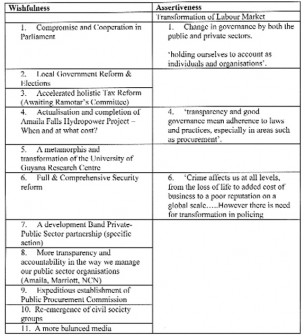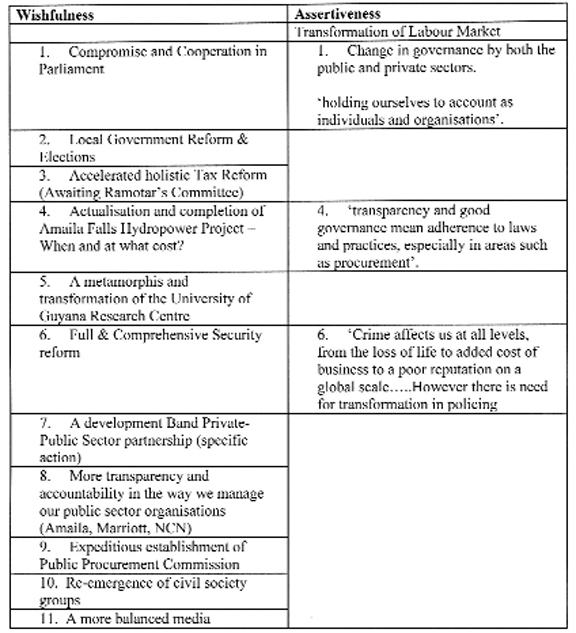Dear Editor,
Regarding Mr Clinton Urling’s letter in SN of December 12, captioned ‘The Georgetown Chamber of Commerce has a wish list…’ with great respect, my initial letter to SN was dated December 7, with the correction of one word sent on Monday, December 10. So that while its actual publication was on December 11, its content could hardly be construed as a commentary related to GCCI’s activities of December 6. In any case my letter specifically addressed “the local private sector as a whole.”
But putting aside the quibble, it may be convenient for readers to compare the issues highlighted (from Contact’s
editorial only) in the respective submissions of December 11 and December 12.
For good measure the following is but a sample of topics addressed in the T&T’s Chamber’s publication:
– transforming government services;
– the role of education in economic transformation;
– the long road to economic transformation; and
– unemployed youth.
Hopefully the above would excite discussion as to whether the ‘wish list’ “articulated all of the points referred to by the letter writer.” One suspects that some will confirm that it is truly a ‘wish list’; others may even substitute equivocation for ‘articulation,’ while searching to identify specific positions, proposed initiatives or interventions.
As a sample:
Wish 1: What formula is being mooted for compromise?
Wish 3: If the committee referred to is actually operational, has the private sector made a relevant submission?
 Wish 4: See remarks at 4 in right column
Wish 4: See remarks at 4 in right column
Wish 5: What has been the private sector’s development plan following the stirring presentation made to it by UG’s last Vice Chancellor? Would it subscribe funding to “research and development”?
Wish 6: Appears to ignore earlier substantive recommendations for reform. Should the private sector assert its own, while waiting? See also 6 in column
Wish 8: See again 4 in right column. Any ‘wishes’ about NICIL?
Wish 10: How is it planned to exhume the spirit and body of the People’s Parliament?
Not many these days would disagree with the proposition that ‘perception is real’ – a substantive factor in any marketing strategy.
At the same time there is also a consensus that the ‘proof of the pudding is in the eating.’ For digestion therefore the private sector should consider organising a discourse by civil society of the foregoing menu of ‘wishes’ in a structured format, the outcomes of which would represent a joint commitment to take responsibility for the solutions consensually proposed.
Finally it may not be wholly inappropriate to note in his highly acclaimed book titled The Seven Habits of Highly Effective People that Stephen Covey should quote Albert Einstein’s observation: “The significant problems we face cannot be solved at the same level of thinking we were when we created them.”
But take your pick. Covey himself asserts: “Interdependence is a choice only independent people can make. Dependent people cannot choose to become independent. They don’t have the character to do it; they don’t own enough of themselves.”
Yours faithfully,
E B John










